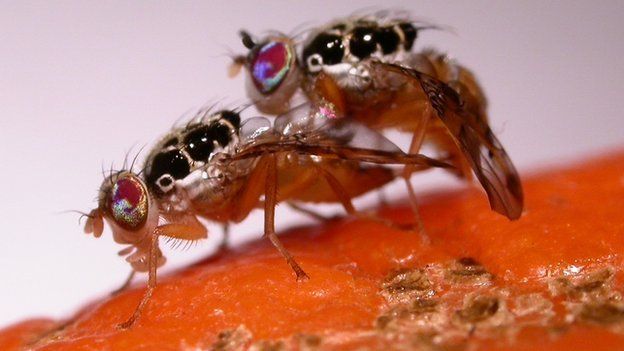Genetically modified flies 'could save crops'
- Published

A type of genetically engineered fly which eventually kills itself off could be an effective method of pest control, according to new research.
These male mutant flies have a lethal gene which interrupts female development.
They were trialled in a greenhouse resulting in "population collapse".
If released into the wild, they could prevent damage to crops in a way that is cheap, and environmentally friendly, according to the researchers.
But others oppose the technology and say releasing genetically modified flies into the wild could have unintended consequences.
The research is published in the journal Proceedings of the Royal Society B.
The Mediterranean fruit fly is a global agricultural pest which infests over 300 crops, including wild fruit, vegetables and nuts, causing extensive damage.
Currently, techniques for pest control include sterilisation and insecticides. However, sterile flies do not mate as well in the wild as the process to make them sterile weakens them. Insecticide also poses problems as flies can quickly develop immunity.
The male GM flies produced by Oxfordshire-based biotechnology company Oxitec are only capable of producing male offspring. They have what Oxitec calls "pre-pupal female lethality". In other words, a female specific gene kills the females before they become adults.
This means that after several generations, the flies die off as the males can no longer find mates.
In order to breed the flies in the lab, the company can "silence" the lethal gene using an antibiotic called tetracycline. This works as a chemical switch which represses the fatal gene. When the chemical is removed, females no longer survive.
"This allows you to reach thousands or millions of male insects all carrying this gene construct... Very rapidly you get a sex biased population of only male individuals, which is not sustainable," explained lead author Philip Leftwich, from the University of East Anglia and Oxitec.
"In a local area where you perform this process, the population levels quickly shrink, massively reducing the amount of crop damage," he told the BBC's Science in Action programme.
The next step, he added, would be open field trials, which would need government approval.
Oxitec has already completed extensive field trials with GM mosquitoes in Brazil in order to prevent the spread of dengue fever, killing 96% of the dengue-spreading mosquitoes. They are also bidding to trial GM insects in Europe to reduce olive flies in Spain, a major pest for olive production.
Helen Wallace from Genewatch, an organisation that monitors the use of genetic technology, is critical of the work. She said that the long-term effects of releasing millions of GM flies would be impossible to predict.
She was also concerned that dead fly larvae could be left inside crops.
"Fruit grown using Oxitec's GM flies will be contaminated with GM maggots which are genetically programmed to die inside the fruit they are supposed to be protecting.
"Contaminated fruit won't be welcome on the market and could be bad for health. Male GM flies will survive for multiple generations and could be spread worldwide when fruit is transported."
She added that the genetic killing mechanism was likely to fail in the longer term as the GM flies evolve resistance or breed in sites contaminated with the antibiotic tetracycline, widely used in agriculture.
Responding to concerns, Dr Leftwich said that the flies have been extensively tested with no reason to think they would have adverse effects, which the team would monitor closely.
"The nature of the modification to the flies, it's important to stress, is it makes them disadvantageous to their local counterparts in that they can only produce sons. If we stopped releasing these individuals they would quickly be removed from the gene pool."
Listen to Science in Action on the BBC World Service on 14 August at 19:30 BST or download the podcast here
Follow Melissa on twitter
- Published10 June 2014
- Published20 November 2013
- Published14 October 2013
- Published30 October 2011